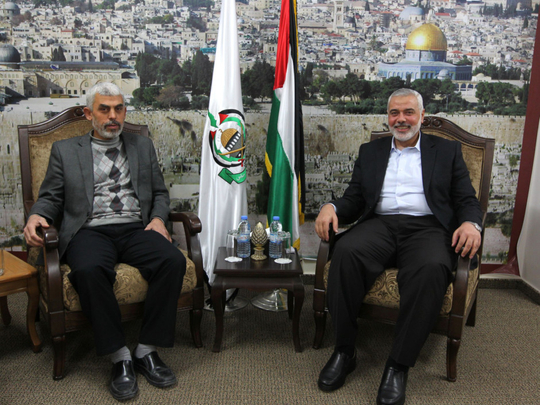
The war drums are beating. Many are gripped with fear that the recent election of Yehya Sinwar as the new leader of Hamas in the Gaza Strip will make war with Israel ever more likely. Sinwar has popped up as the popular choice for the Hamas rank-and-file who voted him to be as the next leader of the movement. This is seen as a bitter blow to the current political leadership of the organisation, which has been trying to steer a “moderate” course.
His election means it is the radicals who are back in power. Sinwar is seen as a hawk, coming from the militarised Izzeddine Al Qassam Brigades that takes a hardline abrasive approach in dealing with Israel. Ismail Haniyeh, who is making a bid to wrest the overall leadership position in Hamas from Khalid Mesha’al, will be intent on more militant activities, thereby making war prospects with Israel greater.
If this happens, it will mean the region will enter into a fourth deadly cycle of conflict following the 2009, 2012 and 2014 wars, with the last devastating Gaza. All the protagonists, including Israeli Defence Minister Avigdor Lieberman, who is sabre-rattling with his usual promises of “we will completely destroy them” in reference to Hamas and Gaza, are raising the ante and readying for battle.
Over the past few months, Hamas officials have been saying the military capability of the Islamic movement have been restored to the pre-2014 levels and the Izzeddine Al Qassam Brigades are in position to launch another bloody showdown with Israel. Hence the election of Sinwar, a militant hardliner long known to have gone after Palestinian collaborators by developing the movement’s intelligence services since the early 1980s, will add to the view that war will certainly be imminent. This has recently been spelt out by the current right-wing Israeli Education Minister Naftali Bennet, who said it is a “question of time, not a question of if”.
But it does not need to be a slippery-slope to mayhem. Although adopting a militant stance, Sinwar has also been seen as a pragmatic politician with a panache for the charismatic. Despite the fact that he has been in prison for 23 years and set free by Israel in 2011 in a prisoner-exchange for Gilad Shalit, Sinwar has views that may have appeared to be contradictory over the years.
In 2006, for instance, while in prison, he adopted the stance that there must be a long-standing “truce” with Israel because it is the stronger party, echoing a line of thought that subsequently became an influential strand of belief among the mainstream political leadership of Hamas that came to argue for a form of recognition and coexistence with Israel.
Later on, after he was set free, along with more than 1,000 other prisoners, Sinwar advocated reconciliation with Fatah and the Palestinian National Authority and was the driving force behind the 2014 talks. The fact that they stalled the process can’t be blamed on Sinwar alone but on the general atmosphere between the two Palestinian movements that want a deal but want it on their own terms.
Sinwar plays politics just like other politicians. Under his regime, he is likely to continue to make amends with Iran, a process that has already started under the outgoing Hamas leadership as Tehran has proved a strong financial backer over the past years. But he also wants to maintain a friendly posture with Turkey, Qatar and Egypt as a sign of moderation. This means he will likely toe the line of the previous leadership that sought to build relations with many parties and countries as much as possible and suggested a two-state solution to the Palestinian-Israeli conflict.
It is unlikely that Sinwar will lead the movement into war and plummet Gaza into another disaster, irrespective of his personal views and animosities regarding Israel. He will likely take heed of the other institutions in Hamas as proved so far. The movement has been undergoing a long process of elections that started in the middle of 2016 and will end in the next two months with the choice of a new Political Bureau and a Shura Council and where decision-making is arrived at collectively.
As pointed out by Hamas officials, Sinwar is one individual among many who has to be taken into account.
The course of the movement has been set regardless of who controls it — the military wing, brigades, political leadership, doves, hawks or those who believe in intra-Palestinian reconciliation and those who don’t. In July 2016, Sinwar was put in charge of the file of the four Israelis held captive by the Al Qassam Brigades. Like with the mediation over Shalit, the prisoners are likely to be used as bargaining chips for the release of more Palestinian inmates and Sinwar is likely to lead the negotiations, most probably through third parties. This despite the fact that Israeli officials say two of the Israelis were killed in the 2014 war.
Thus, an imminent war with Israel may not at all be likely as Sinwar has much to consider before angling the movement in that direction, including adhering to improving the lot of Gazans who have been under a tightly-sealed siege since 2007, when Hamas took over the Strip.
Marwan Asmar is a commentator based in Amman. He has long worked in journalism and has a PhD in Political Science from Leeds University in the UK.









